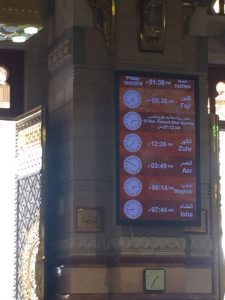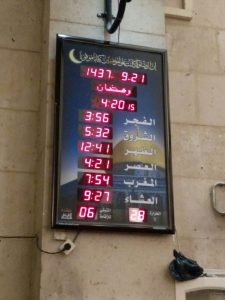MISSION STATEMENT
Ishrak and Duha
You can pray these two prayer times individually or combined, as well as your 5 daily prayers
Ideally the purpose of these payers is to give you two chances until midday to replace your Fajr prayer
The “I didn’t get up early enough” does not have a leg to stand on!
Prayer Timetable
Our mission is to bring to you a comprehensive prayer timetable that is simple, clear, precise and perfectly balanced. This balance is achieved through allocating the same amount of time to each prayer/combination prayer times in relation to the length of the day/night. We aim to teach you to work out in detail the prayer times, and how each fits in with the position and condition of the sun (see prayers page)
We are created to worship Allah so let’s get our primary art of worship right, at the right time, and the required quantity. (You can do more if you want but there is no obligation). At the moment the Muslim world has moved from 5 daily prayers to 6. The sixth being Shirak/ishrak/sharook, which is commonly referred to as the beginning of day prayer (see timetable below). However, there are 7 daily prayer, Duha/Zuha/Chast, being the seventh. Duha is given the name chast/chasht in the Indian sub-continent.
THE 7PRAYERS.COM PRAYER TIMETABLE
The prayer timetable is put together in day and night tables separately so it’s easier to understand how it became common knowledge that Muslims pray 5 times a day because Fajr and Isha are not day time prayers.
Ideally pray each prayer in the independent prayer times given.
If you are praying in combination prayer times, pray both of the prayers.
Combined prayer times are for early/late praying due to work and commitments.
Jamaat times should be fixed at the independent prayer times and not at combined prayer times.
If you follow this timetable you should come to realise that the human body is set to this by nature.
This format of calculating the daily prayer times only applies to place where the sun sets and rises daily.
THE HISTORY OF 7PRAYERS.COM
We at 7prayers.com, through years of research on the subject of the Islamic prayer timetable, have come to the conclusion that they prayer timetable that the Muslim world is following has been tampered with. So it is now incorrect from a variety of angles, found under the compare heading.
This prayer timetable is considered correct from various angles such as:
Fair – each prayer requires the same amount of rakaats (see step 9&10 of guide).
Simple – you can see when each prayer time starts and ends. Also with an allowance for early or late praying.
Balanced – each prayer is allowed the same amount of time.
Comprehensive – All 7 daily prayers are accounted for.

This is the timetable from Masjid Nabvi, Madina, Saudi Arabia. Masjid Nabvi and Masjid Al-Haram (Mecca) are both under Saudi government so should both have the same prayer timetable format.
The prayer time for Shirak (6th daily prayer) is given as fixed 15 minutes after sunrise. This is correct for the shortest days of the year but not for the longest. Prayer times are variable due to the length of day/night.

This is the timetable from Masjid Al Aqsa, Jerusalem, Palestine,, masjid. Al Aqsa was Qibla (direction to face for praying). at one time.
The prayer time for Shirak/6th daily prayer is given at sunrise. This time would be ok for the combination of Fajr and Shirak time but not for Shirak independently as it indicates.
The purpose of the two timetables above:
- To give evidence to the stated fact that Muslims have moved from 5 prayers to 6 daily.
- To highlight that the Muslim leaders are guessing and not properly calculating the prayer times so the remainder of the muslim world follows suit, not knowing clearly where they stand.
